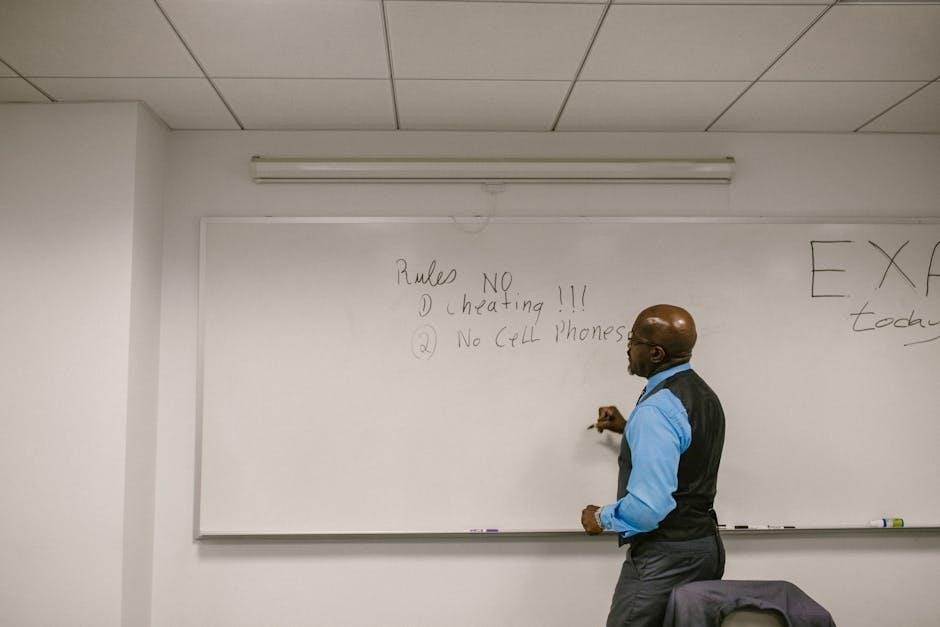The CBT-100 form is a critical document for New Jersey corporations to report business income and deductions accurately. It ensures compliance with state tax laws and provides detailed guidelines for electronic filing, payment procedures, and required documentation. Corporations must adhere to specific deadlines and nexus requirements to avoid penalties. The instructions outline essential steps for preparing and submitting the return, emphasizing the importance of electronic submissions and inclusion of federal tax documents. This guide offers a comprehensive framework for understanding and completing the CBT-100 accurately, ensuring adherence to New Jersey’s tax regulations.
Overview of the New Jersey Corporation Business Tax Return
The New Jersey Corporation Business Tax Return (CBT-100) is a mandatory form for corporations operating in the state. It requires detailed reporting of business income, deductions, and tax calculations. The return applies to all corporations, including banking and financial institutions, ensuring compliance with state tax laws. Filers must submit electronically, adhering to specific deadlines and nexus requirements. The form also mandates the inclusion of federal tax documents and related schedules. Understanding the CBT-100 is crucial for accurate filing and avoiding penalties, ensuring proper tax compliance for businesses in New Jersey.
Importance of Following the Guidelines
Adhering to the CBT-100 instructions ensures accurate reporting and compliance with New Jersey tax laws. Properly following guidelines prevents penalties and delays, maintaining seamless business operations. corporations must submit required documents, including federal returns and schedules, to avoid discrepancies. Electronic filing mandates and payment procedures must be strictly followed to ensure timely processing. Compliance with nexus requirements and tax rates guarantees fair assessment and avoids legal complications. By following the guidelines, corporations can efficiently meet their tax obligations and maintain good standing with state authorities, fostering a smooth and lawful business environment in New Jersey.
Electronic Filing Mandate
All taxpayers and tax preparers must file Corporation Business Tax returns and payments electronically, including returns, estimated payments, extensions, and vouchers, to comply with state requirements.
Requirements for Filing CBT-100 Electronically
To file the CBT-100 electronically, taxpayers must use approved tax software or the New Jersey Division of Taxation’s online portal. All returns, payments, extensions, and vouchers must be submitted digitally. Additionally, corporations are required to include a complete copy of their federal Form 1120 and all relevant schedules. Electronic filing ensures faster processing and reduces errors. Tax preparers and corporations must register for an account and comply with specific formatting and submission guidelines outlined in the official instructions.
Benefits of Electronic Submission
Electronic submission of the CBT-100 offers numerous advantages, including faster processing, reduced errors, and quicker refunds. It eliminates postal delays and provides instant confirmation of receipt. Additionally, electronic filing is more secure, minimizing the risk of lost or damaged documents. Taxpayers can easily track the status of their return online. This method also supports environmental sustainability by reducing paper usage. Corporations can ensure compliance with New Jersey tax laws and stay updated with the latest tax regulations through electronic filing.
Filing Deadlines and Payment Procedures

Adherence to prescribed deadlines is crucial for timely submission and payment. Corporations must file the CBT-100 and remit payments electronically, using vouchers like CBT-100-V, ensuring compliance with New Jersey tax regulations.
Key Dates for Submitting CBT-100
Corporations must file the CBT-100 by April 15th annually for calendar-year filers, or the 15th day of the 4th month following the close of the fiscal year. Extensions are granted until October 15th, but estimated taxes must be paid quarterly. Payments for extensions and estimated taxes are due on April 15th, June 15th, September 15th, and January 15th of the following year. Electronic submissions are mandatory, and missing these deadlines may result in penalties. Ensure timely filing to avoid late fees and interest on unpaid taxes.
Methods for Making Payments
All CBT-100 payments must be made electronically through the New Jersey Division of Taxation’s online portal. Accepted methods include e-check, credit card, or debit card. Corporations can schedule multiple estimated payments using Form CBT-150 via e-check. Extensions can be filed with Form CBT-200-T, accompanied by payment. Payments for deficiencies and amended returns are also submitted electronically. Ensure timely payment to avoid penalties and interest. The system allows for payment tracking, modification, and cancellation, providing flexibility for corporations to manage their tax obligations efficiently and in compliance with state regulations.

Nexus Thresholds and Tax Rates

Nexus thresholds determine if a corporation is subject to New Jersey taxation. Meeting specific economic thresholds triggers tax obligations. Tax rates vary based on income and nexus status.
Understanding Nexus Requirements
Nexus determines if a corporation has sufficient connection to New Jersey, requiring it to file the CBT-100. Economic nexus thresholds are based on sales, property, or payroll in the state. Corporations meeting these thresholds must comply with tax obligations. Financial business corporations and banking corporations have specific nexus rules. Additionally, combinable captive insurance companies must file if not part of a combined group. Understanding these requirements ensures proper compliance with New Jersey tax laws. Always refer to official guidelines for detailed criteria and exemptions.
Current Tax Rates for Corporation Business Tax
New Jersey imposes a Corporation Business Tax with rates based on taxable income. The tax rate is 6.5% on taxable income up to $50,000 and 8.85% on income exceeding $50,000. Certain corporations, such as banking and financial businesses, may have specific rates. A minimum tax of $500 applies to corporations with entire net income exceeding $100,000. Combined groups filing Form CBT-100U must follow unitary tax principles. Always refer to official guidelines for the most accurate and updated tax rate information.

Required Documents and Schedules
The CBT-100 requires supporting forms, schedules, and a complete copy of the federal Form 1120. Include all relevant federal schedules and a Nexus Questionnaire if applicable.

Supporting Forms and Schedules Needed
When filing the CBT-100, ensure you include all required supporting documents. This includes federal Form 1120, applicable schedules, and any additional forms relevant to your business. Attach Schedule A for adjustments and Schedule B for apportionment calculations. If applicable, submit Schedule C for combined returns or Schedule N for nexus-related information. Include a completed Nexus Questionnaire to verify business presence in New Jersey. For amended returns, clearly mark the form as “AMENDED RETURN” and provide corrected schedules. Ensure all documents align with New Jersey tax regulations and submission guidelines.
Including Federal Tax Returns and Amendments
Include a complete copy of your federal Form 1120 or other applicable federal corporate returns with your CBT-100 submission. For amended returns, use the CBT-100 form for the correct tax year and clearly write “AMENDED RETURN” on the front page. Ensure all federal schedules and forms are attached, as they are essential for accurate state tax calculations. Refer to instruction 48 for detailed guidance on amending returns and required documentation. This ensures compliance with New Jersey tax regulations and facilitates a smooth filing process.

Amending Returns
To amend a CBT-100 return, use the form for the appropriate tax year and write “AMENDED RETURN” clearly on the front page. Follow instruction 48 for details.
How to File an Amended CBT-100

To file an amended CBT-100, obtain the form for the relevant tax year and clearly mark “AMENDED RETURN” on the front page. Include all necessary supporting documents, such as federal tax returns and schedules, to explain the changes. Ensure accuracy in reporting corrections or additions to income, deductions, or credits. Submit the amended return electronically, as New Jersey mandates e-filing for all CBT returns. Double-check all information to prevent delays in processing. Refer to instruction 48 for specific guidance on amending procedures and requirements.

Special Instructions for Amended Returns
When filing an amended CBT-100, ensure the return is submitted electronically, as paper submissions are not accepted. Clearly mark “AMENDED RETURN” on the form’s front page and include a detailed explanation of changes. Attach a complete copy of federal Form 1120 and all relevant schedules. Correct any errors or omissions from the original filing and ensure all calculations are accurate. Additional forms, such as Schedule B, may be required to support amendments. Follow the instructions carefully to avoid delays in processing the amended return.
Resources and References
Visit the New Jersey Division of Taxation website for official CBT-100 guides, forms, and updates. Refer to the comprehensive PDF instructions for detailed filing guidance and support.
Official Guidelines and Publications

The New Jersey Division of Taxation provides official guidelines and publications for the CBT-100 form. These include detailed instructions, schedules, and related forms to ensure accurate filing. The CBT-100 General Instructions document offers comprehensive guidance on electronic filing, payment procedures, and required documentation. Additionally, the division publishes annual updates reflecting changes in tax laws and regulations. Taxpayers can access these resources on the official New Jersey Treasury website, ensuring they have the most up-to-date information for compliance with state tax requirements.
Where to Find Additional Help
For assistance with the CBT-100, visit the New Jersey Division of Taxation website, which offers detailed resources, FAQs, and instructional guides. Tax professionals and certified public accountants can also provide expert guidance. Additionally, tax preparation software often includes support for CBT-100 filings. Contact the Division of Taxation directly at (609) 292-6400 or via email for specific inquiries. Workshops and webinars are periodically available to help navigate complex tax topics. Ensure to check for updates and additional materials on the official New Jersey Treasury portal.
Accurate filing of the CBT-100 ensures compliance with New Jersey tax laws. Follow guidelines carefully and stay informed about updates to maintain proper tax adherence and avoid penalties.
Final Tips for Accurate Filing
Ensure all data aligns with federal returns and schedules. Double-check calculations for accuracy. Submit electronically by deadlines to avoid penalties. Include required nexus documentation. Verify tax rates and thresholds apply correctly. Consult official guidelines for specific scenarios. Maintain clear records for audits. Use updated forms to reflect current tax laws. Seek professional help if uncertain. Adhere to payment procedures outlined. Review all instructions thoroughly before submission. Ensure compliance with New Jersey’s electronic filing mandates for a smooth process. Stay informed on updates to tax regulations.
Staying Compliant with New Jersey Tax Laws
Stay informed about updates to New Jersey tax laws and regulations. Ensure accurate nexus determinations to avoid penalties. File electronically and include all required federal forms and schedules. Verify tax rates and thresholds apply correctly. Double-check calculations and deadlines to maintain compliance. Keep detailed records for potential audits. Stay updated on form changes, such as the upcoming replacement of CBT-100 with CBT-1. Adhere to electronic filing and payment mandates to ensure timely and accurate submissions. Regularly review official guidelines for compliance.